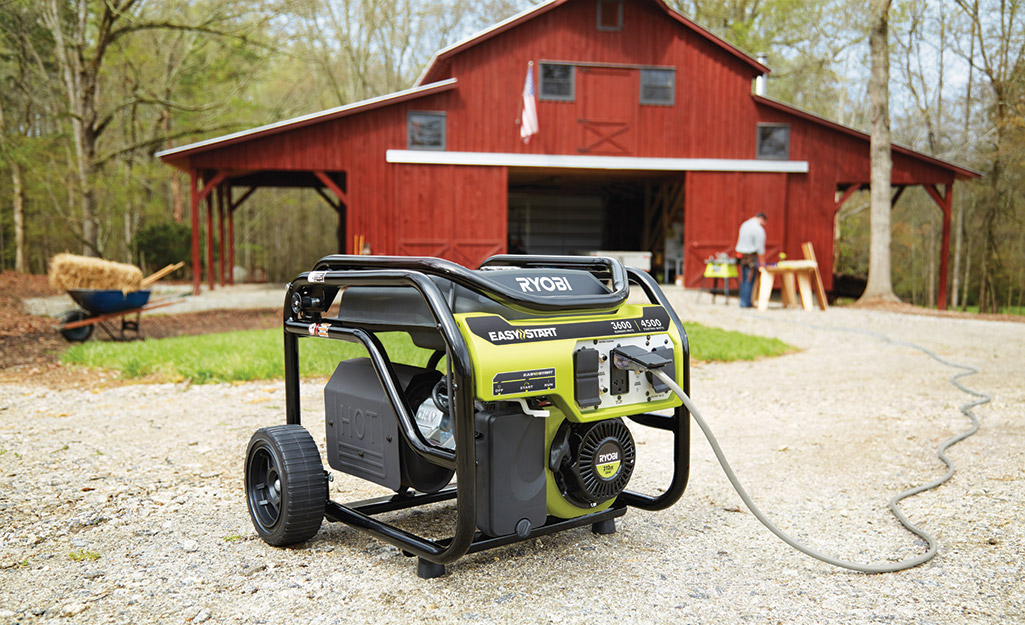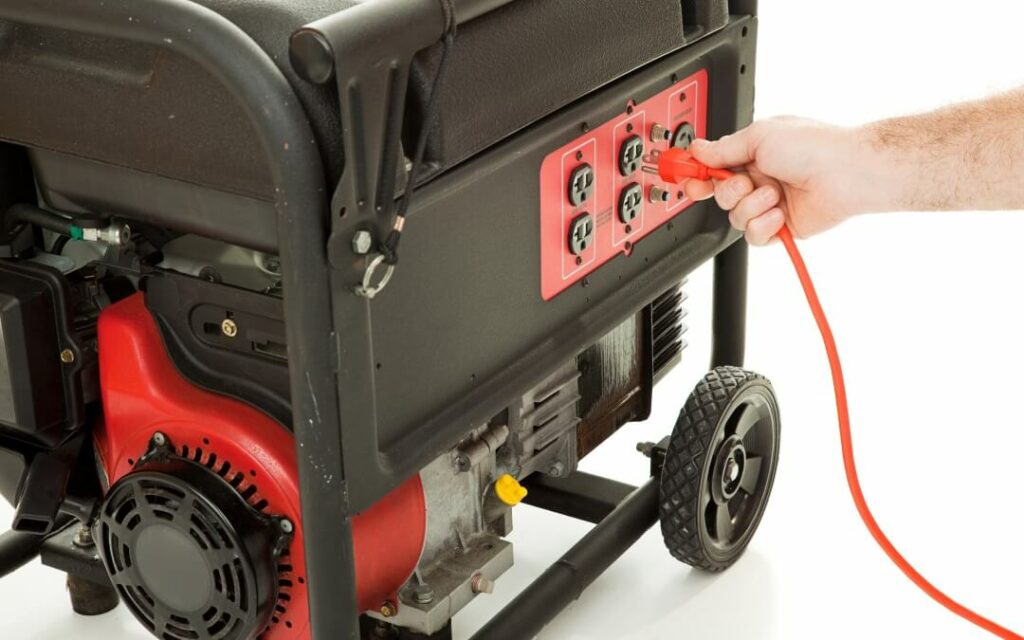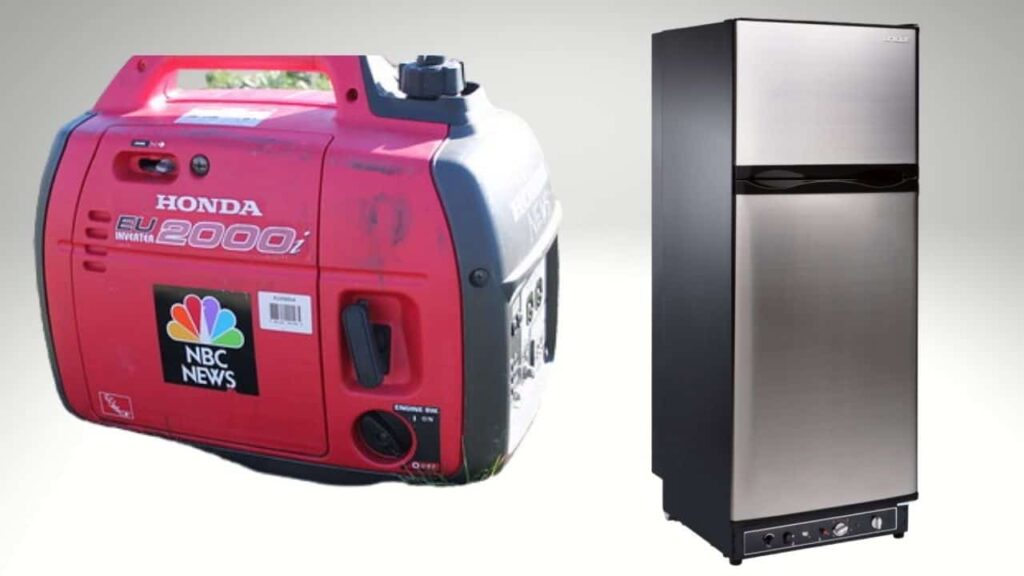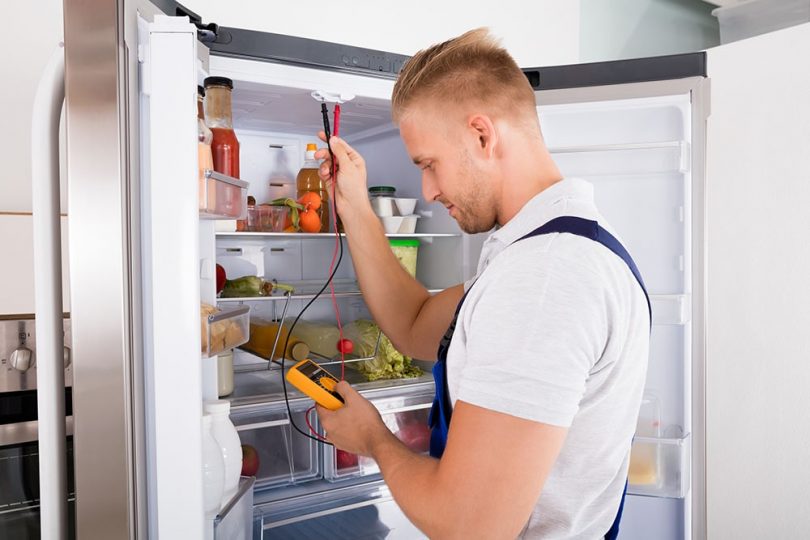Do you want to plan before an emergency power outage affects your home appliances such as refrigerators, freezers, etc.? Finding the right generator size to run a refrigerator can ease your life during such days.
You don’t need to be an engineer to find the right generator size to run a refrigerator. (If you are, you still can read it for fun). This guide will help you understand the technical facets to find the right generator size to run the refrigerator and freezer in just three easy steps.
What Is a Generator Size?
 You must know the Generator output before picking the right generator size for your home refrigerator.
You must know the Generator output before picking the right generator size for your home refrigerator.
Watts (W) and kilowatts (KW) are the metrics to measure a Generator’s power. Generator size refers to the number of Wattages rather than the physical size of the machine. Generators come in different sizes to accommodate power outage requirements. You can pick from sizes such as small, medium (3000-5000 watts), large (6000-9000 watts), and extra-large (10,000 watts and more).
Similarly, Generators come in different types such as portable, inverters, standby, industrial and induction generators. Generators used for home usage are mostly Portable and inverters. Read the below steps to choose the right generator size to run a refrigerator to avoid inconvenience during a power supply outage.
Steps to Find the Right Generator Size to Run Refrigerator
Step 1: Pen Down Appliances to Calculate the Right Generator Size
Are you living in an area with frequent power outages? If so, it is better to count in all the appliances you want to run on a generator, as you can’t buy a generator for every home appliance. Refrigerators and Freezers have different power requirements. You must consider them as separate devices before buying the right sized generator.
Besides this, TV, wall pumps, electric lighting circuits are a few other things you must keep in mind. As we are focusing on generator size to run a refrigerator, so the rest of the guide will consider the selected device.
Step 2: Find Your Refrigerator Wattage for the Right Generator Size
You must be aware of the correct watts of your refrigerator. Before going into further details, it is mandatory to understand two important concepts. This will help you to figure out the right generator size to run a refrigerator.
Starting Watts (also called peak watts or surge watts): Most appliances with electric motors (such as refrigerators & freezers) utilize extra watts to start. These extra watts are required to start the electric motor of the appliance and consumed for a limited time only (2-3 seconds).
 Running Watts (also called rated watts): As obvious from the name, running watts is the desired energy required for the smooth running of an appliance.
Running Watts (also called rated watts): As obvious from the name, running watts is the desired energy required for the smooth running of an appliance.
You must know the peak and surge Watts of your refrigerator or other home appliances. These watts will help you to figure out what size generator is right to run a refrigerator
The refrigerator’s instructions manual contains details about the running and starting watts. You can also check the data plate (or labels) inside or back of your refrigerator for the refrigerator Watts’s details. If you know these two values, you can find the right generator size to run the refrigerator in mere a few minutes.
You can also look for the number of Volts and Amps of your refrigerator. Multiply the two numbers to find the wattage required to run the refrigerator. For example, a refrigerator of 116v and 6.9amp is 800 watts.
Refrigerators come in various sizes and features. Every size and model has different watts requirements. Refrigerators, on average, use 800-1200 starting watts an hour per day. Running watts for a refrigerator are approximately 150 watts an hour per day.
Step 3: Calculate the Right Generator Size to Run Refrigerator
You must have understood the starting and running watts of your refrigerator. Choosing the right generator size to run the refrigerator and other appliances is dependent on these two numbers.
For example, a refrigerator with 1200 starting watts would require a generator size of more than 1200 watts. If you want to run a refrigerator and freezer – a generator size that delivers 2000 starting watts would be sufficient. Opting for a generator with lower or almost equal starting watts will create a problem and is not recommended.
Why Choose the Right Size Generator to Run a Refrigerator?
The reason for choosing a slightly bigger generator size is as follows.
1. Small Size Generator Results in Overload
A generator size smaller than your wattage requirements will damage the machine itself. Running a generator more than its capacity will result in noisy machines and excessive emissions. This will overheat a generator, shorten the generator lifespan, and can result in fire or even explosion.
2. An Undersized Generator Can Ruin Your Refrigerator and Other Appliances
An undersized Generator runs on excess capacity and experiences problems such as overheating. Overworked generators could result in intermittent power that can cause damage to the connected appliances. It is advised not to go for an undersized generator to run a refrigerator.
3. Wrong Generator Size Results in Power Supply Issues
A generator lower in capacity than the desired need of a refrigerator (or other appliances) will cause voltage issues. When your refrigerator is asking for more watts, the generator will slow down. As a result, there is a drop in the voltage, and the refrigerator performance is affected.
What Is the Recommended Generator Size to Run a Refrigerator?
 Experts recommend choosing a generator slightly bigger than the required starting watts of a refrigerator (or other appliances). The extra watt of the generator improves its efficiency and performance. A little large generator size eliminates the possibility of running on full load. Besides this, you can have extra watts available to run other things such as lighting circuits and TV.
Experts recommend choosing a generator slightly bigger than the required starting watts of a refrigerator (or other appliances). The extra watt of the generator improves its efficiency and performance. A little large generator size eliminates the possibility of running on full load. Besides this, you can have extra watts available to run other things such as lighting circuits and TV.
The right generator size to run the refrigerator is ideally around 2000 to 3000 watts. A generator with such output can run a few other home appliances as well.
Refrigerators are not included under sensitive appliances. Portable generators are most suitable to run appliances such as refrigerators or TV. However, laptops and computers require inverters for smooth running.
Conclusion
Finding the right generator size for refrigerators and other home appliances seems too technical. If you know your refrigerator’s starting and running watts, you can figure out the right generator size suitable to run your refrigerator on your own. We hope this article has enlightened your understanding of generators and refrigerators. In this article, we have listed the maximum details that will help you to buy a right-sized generator for your refrigerator.
